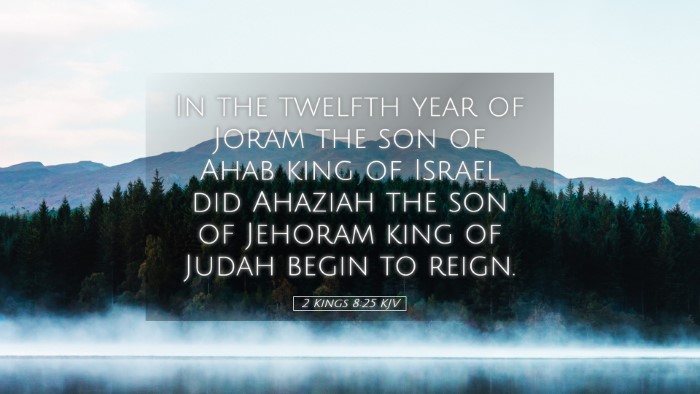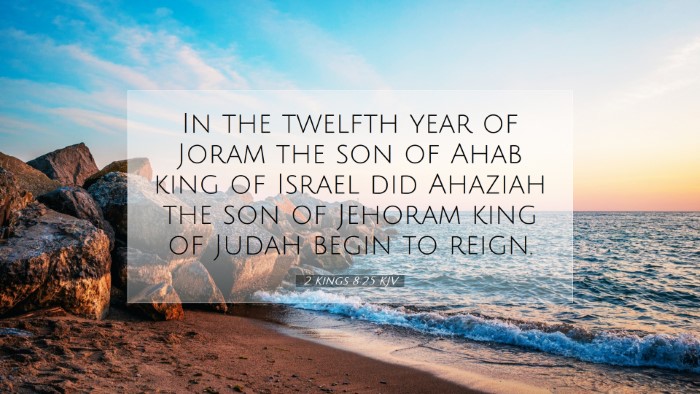Commentary on 2 Kings 8:25
Verse Context: 2 Kings 8:25 states, "In the twelfth year of Joram the son of Ahab king of Israel did Ahaziah the son of Jehoram king of Judah begin to reign." This verse is significant as it situates Ahaziah's reign within the timeline of the kings of Israel and Judah, establishing important historical and theological connections.
Historical Background
The historical narrative of the kings of Israel and Judah is marked by a constant interplay of political intrigue, idolatry, and divine judgment. Ahaziah, king of Judah, is a pivotal figure due to his familial ties to the house of Ahab, which had led Judah into moral and spiritual decay.
Commentary Insights
Matthew Henry's Commentary
Matthew Henry provides a comprehensive insight into the significance of Ahaziah's reign. He notes that Ahaziah was a product of a corrupt lineage, having been influenced by Ahab’s wickedness. Henry argues that his reign did not bring true stability or reform to Judah, reflecting the larger theme of the consequences of Ahab's sinful legacy in Israel and Judah. Henry emphasizes that "the kings of Judah did not learn from the tragic failings of their predecessors" and consequently fell into similar patterns of idolatry.
Albert Barnes' Commentary
Albert Barnes elaborates on the timeline established by the writer of Kings. Noting that the twelfth year of Joram corresponds to a significant period in Israel's history, Barnes underscores the importance of chronological accuracy in understanding the shifts in leadership. He asserts that Ahaziah's ascendance is a reminder of the interconnectedness of the two kingdoms and the overarching narrative of God’s judgment. He states, "The political turbulence of Israel is mirrored in the leadership crises of Judah." Barnes also highlights that Ahaziah's rule was brief, lasting only one year due to his eventual death at the hands of Jehu, which further signifies the precarious nature of leadership during this tumultuous period.
Adam Clarke's Commentary
Adam Clarke adds another layer of interpretation, focusing on the implications of Ahaziah's ascent to power. He points out that his reign symbolizes a continuation of the policies of his mother, Athaliah, and his father's alliances with the corrupt house of Ahab. Clarke suggests that this reflective leadership style perpetuated the spiritual downfall of Judah. He emphasizes that God’s tolerance for this corruption has limits, and Ahaziah's short reign serves as a warning to future leaders: "Divine authority may seem silent, but it will not be forever." Clarke's analysis encourages scholars and theologians to consider the broader themes of leadership accountability and divine sovereignty throughout biblical history.
Theological Implications
This verse presents rich theological implications as it connects the political realm with divine oversight. The succession of kings illustrates the covenantal relationship between God and His people, where leadership is intricately tied to the nation's faithfulness to Yahweh. The fact that Ahaziah began to reign during Joram's rule highlights the complexity of human governance under divine providence.
Covenant and Judgment
Both Henry and Clarke emphasize that the covenant established with David plays a crucial role in the understanding of Judah’s lineage. Ahaziah's reign did not uphold this covenant, much like those of his predecessors. God's judgment upon such transgressions is a recurring theme throughout Kings, affirming that deviations from divine commands bring inevitable consequences.
Faithfulness Amidst Corruption
The insights from these commentaries remind pastors and theologians of the call to faithfulness amidst a culture that often embraces compromise. Ahaziah's ruling serves as an admonition against leadership that conforms to popular but ungodly standards.
Application for Today
Pastors and church leaders today can draw wisdom from Ahaziah’s brief and troubled reign. The portrayal of his character in 2 Kings serves as both a warning and a guide for contemporary leaders. It calls for introspection regarding personal integrity, leadership dynamics, and the impact of alliances—whether political, cultural, or ecclesiastical—on the integrity of one’s ministry and witness.
Conclusion
In summary, 2 Kings 8:25 provides a critical point of reflection for pastors, students, and theologians alike. It emphasizes the significance of lineage and the consequences of abandoning God’s ways, urging current leaders to learn from the past. As Ahaziah stepped into a legacy of turmoil, the faithful are reminded that true leadership is grounded in unwavering fidelity to God's covenant.


